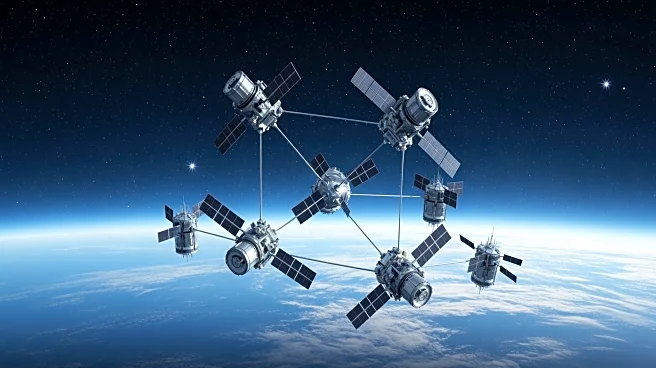What's Happening?
SpaceX has successfully launched 29 new Starlink internet satellites from Cape Canaveral Space Force Station in Florida. The launch occurred on November 9, utilizing a reusable Falcon 9 rocket. The first
stage of the rocket returned to Earth approximately 8.5 minutes after liftoff, landing on a drone ship in the Atlantic Ocean. The upper stage of the Falcon 9 continued to place the satellites into a low Earth orbit, where they were deployed 64 minutes after liftoff. This launch adds to the Starlink megaconstellation, which now includes over 8,800 active satellites, making it one of the largest orbital networks globally. SpaceX has conducted 143 Falcon 9 launches in 2025, with 103 dedicated to Starlink missions.
Why It's Important?
The expansion of the Starlink satellite network is significant for global internet access, as it aims to provide high-speed internet connectivity to underserved and remote areas worldwide. This development is crucial for bridging the digital divide, offering opportunities for economic growth and improved communication in regions lacking reliable internet infrastructure. Additionally, the successful reuse of Falcon 9 rockets demonstrates SpaceX's commitment to reducing space travel costs and advancing space technology. The growing Starlink network also positions SpaceX as a major player in the satellite internet industry, potentially influencing market dynamics and competition.
What's Next?
SpaceX is expected to continue its aggressive launch schedule to further expand the Starlink network. Future launches will likely focus on increasing the number of satellites in orbit to enhance coverage and connection speeds. As the network grows, SpaceX may explore partnerships with telecommunications companies to integrate Starlink services into existing infrastructure. Regulatory challenges and competition from other satellite internet providers could shape the company's strategic decisions moving forward. Additionally, SpaceX's advancements in reusable rocket technology may lead to further innovations in space travel and satellite deployment.
Beyond the Headlines
The expansion of satellite internet services like Starlink raises questions about space debris and the long-term sustainability of satellite networks. As more satellites are launched, the risk of collisions and space debris increases, necessitating international cooperation and regulation to ensure safe and sustainable space operations. Furthermore, the widespread availability of satellite internet could impact traditional internet service providers, prompting shifts in business models and service offerings. The ethical implications of global internet access, including privacy concerns and data security, will also need to be addressed as satellite networks become more prevalent.








